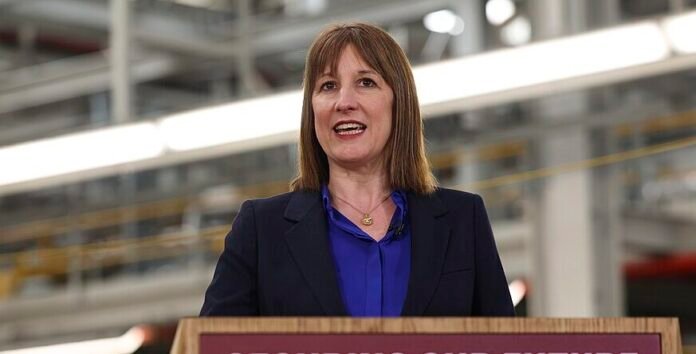Chancellor Rachel Reeves explores tariff cuts on US cars while rejecting compromises on UK food and car safety standards
Rachel Reeves, the UK Chancellor, has signalled openness to reducing tariffs on US car imports as part of ongoing trade discussions with Washington, but reiterated that the UK would not compromise on food safety or vehicle standards.
Addressing a conference in Washington, Reeves discussed the possibility of reducing tariffs on US cars exported to the UK, acknowledging that both nations had significant trade barriers in place. “I would like to see those tariffs and non-tariff barriers reduced,” Reeves stated, highlighting the importance of negotiating a deal that benefits the UK.
While Reeves is eager to reduce trade barriers, she clarified that any deal would be in the UK’s national interest and would not come at the cost of lowering standards. Her comments come amid growing tensions in UK-US trade talks, particularly regarding the US’s desire for greater access to British markets, including agriculture. US officials have urged the UK to ease restrictions on food imports, with the possibility of allowing “inferior meat” from the US, which has sparked strong opposition from UK politicians.
Labour leader Sir Keir Starmer has firmly committed to maintaining “the highest animal welfare standards,” and has rejected the notion of lowering food safety regulations to accommodate US imports. This view is echoed by Downing Street, which reaffirmed that the UK’s ban on hormone-treated beef and chlorine-dipped chicken remains a “red line” in trade discussions.
Reeves, however, did not dismiss the potential to cut the UK’s tariffs on US cars from 10% to 2.5% in exchange for reciprocal reductions on UK cars entering the US, where a 25% tariff has been imposed. While Reeves did not commit to specific numbers, she noted that such a reduction could be negotiated without violating World Trade Organisation rules, which could allow the US to be given special treatment in a free trade agreement.
Trade expert David Henig suggested that while reducing tariffs on US car imports might be feasible, such deals typically require covering “substantially all trade,” which may not always be a strong principle under WTO rules. Given that US car exports to the UK are modest in comparison to those from Europe, a tariff reduction would likely have a limited impact on the UK car industry. British manufacturers, particularly luxury brands like Bentley, Aston Martin, and Jaguar Land Rover, have been significantly affected by US tariffs.
Reeves acknowledged the pressures placed on the UK’s car sector due to Trump’s 25% tariffs but maintained that any deal must be carefully considered. “We are not going to rush into a flawed deal,” she warned. “The strength of our trade relationship, defence, and security ties with the US is unmatched, and any agreement should build on these strengths.”
The UK’s car safety standards, which are more stringent than those in the US, remain a key point of contention. Reeves reaffirmed that the UK would not lower its vehicle safety standards in response to external pressures. “We are not going to be changing our standards based on asks from foreign governments,” she said. The government will continue to make decisions on food and vehicle safety standards independently, without outside influence.
Embed from Getty ImagesWhile Reeves has not committed to a specific timeline for concluding the trade deal, she emphasised that the UK will not rush the process. “We will get the right deal which is in our national interests,” she said, underscoring the importance of securing a balanced and fair agreement with the US.
As discussions continue, the UK is facing increasing pressure from British manufacturers, including the car industry, to secure an easing of Trump’s trade barriers, which are harming key exports. Mike Hawes, CEO of the Society of Motor Manufacturers and Traders, has warned that the 25% tariff on UK cars is having a severe impact on luxury brands, which are a major part of the British car industry.
THE GUARDIAN
UK Chancellor Rachel Reeves has tempered expectations for a swift trade deal with the Trump administration, stressing that the UK is “not going to rush” negotiations. Ahead of her meeting with US Treasury Secretary Scott Bessent, Reeves highlighted that talks would focus on enhancing trade ties, not immediate concessions. The UK has already offered compromises, including reducing digital services taxes on US tech firms, and is seeking relief from US tariffs on cars, steel, and aluminium. However, new US demands, including allowing hormone-treated beef, have raised tensions. Reeves rejected these, asserting that the UK’s food standards would remain unchanged. She acknowledged the difficulties faced by UK carmakers but reiterated that a “right deal” for Britain was the priority. While market optimism rose after Trump hinted at a softer stance on Chinese tariffs, the complexity of the UK-US trade deal remains evident.
BBC
UK Chancellor Rachel Reeves has expressed readiness to cut tariffs on US car imports as part of ongoing trade negotiations with the Trump administration. Speaking in Washington, Reeves stressed that while the UK is keen to secure a deal, it will not rush the process, focusing instead on achieving an agreement in the national interest. This statement precedes her meeting with US Treasury Secretary Scott Bessent and comes amid rising global market optimism surrounding the easing of US-China tariffs.
Reeves has faced pressure from the UK’s automotive sector, where manufacturers like Jaguar Land Rover and Rolls-Royce fear job losses due to current tariffs. However, Reeves has firmly rejected US demands to relax food and agricultural standards, especially regarding hormone-treated beef. While tariff reductions could be on the table, she emphasised that the UK’s sovereignty over food and auto standards would not be compromised. The outcome of these talks could have significant implications for UK-US trade relations.
